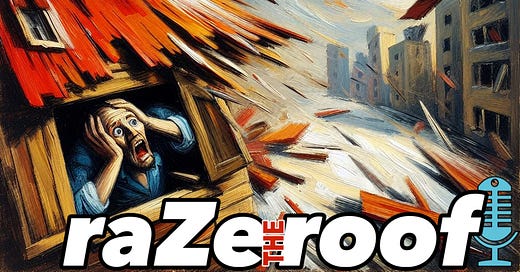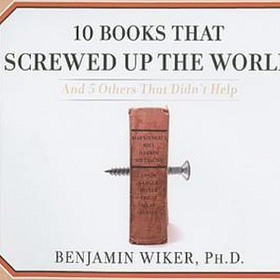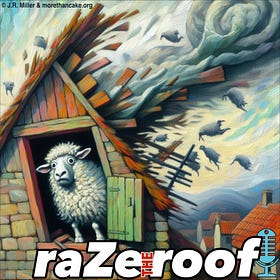Ideas have consequences and so today Joe Miller and Leroy Hill are joined by Kevin Briggins to offer a biblically sound and philosophically robust discussion of Margret Sanger’s 1922 book The Pivot of Civilization. They’ll show how Sanger’s Social Darwinism shaped the eugenic mission of Planned Parenthood, influenced the Western worldview, and maybe even deformed the theology of many Christians. Through their witty banter, the guys till the soil of culture to sow the seed of the Gospel.
REFERENCES
10 Books that Screwed Up the World: And 5 Others That Didn't Help by Benjamin Wiker
Favorable biography of Margaret Sanger by Freedom From Religion Foundation
Margaret Sanger: “No Gods, No Masters” by Bob Perry for the Christian Research Institute
Planned Parenthood Removes Margaret Sanger’s Name from New York Center from EWTN
Planned Parenthood's Racist Origins from Human Life International
Full 1957 Mike Wallace Interview with Margaret Sanger on C-SPAN
EPISODES IN THIS SERIES
10 Books that Screwed Up the World
If you want to understand the culture, you need to understand philosophy. But if that task seems overwhelming, this podcast series is just for you.
RELATED EPISODES
Ep 22 - Darwinian Racism and the Nazi Worldview
Today we’re going back in time to 2020 when Dr. Miller went 1 on 1 with Richard Weikart to discuss how the Darwinian worldview helped create the scientific racisms of the 20th century through the eugenics movement. The show goes beyond the history and explores how this Darwinian thinking influences science, religion, and public policy today.
Ep 25: Darwin's Descent of Man into Inhumanity
Ideas have consequences and so today Joe Miller and Leroy Hill are joined by Richard Weikart to offer a biblically sound and philosophically robust discussion of Darwin's 1871 book, The Descent of Man and Selection in Relation to Sex. They’ll show how Darwin’s embrace of the godless philosophy of human evolution stands behind many of today’s moral confl…
STUDY GUIDE
This study guide is designed to help you review and deepen your understanding of the provided text concerning Margaret Sanger's worldview and its impact.
SUMMARY OF THE BIG IDEAS
Social Darwinism: The application of Darwinian evolutionary theory to human society, suggesting that individuals or groups are subject to the same laws of natural selection as plants and animals. "Survival of the fittest" applied to human populations.
Eugenics: "Good breeding"; a set of beliefs and practices aimed at improving the genetic quality of the human population, typically by excluding people and groups judged to be "inferior" and promoting those judged to be "superior." Sanger explicitly supported forced sterilization (Buck v. Bell) and sought "racial purification."
Planned Parenthood: Organization founded by Sanger, whose eugenic mission is highlighted in the discussion.
"No Gods, No Masters": Slogan on the masthead of Sanger's Women Rebel magazine, reflecting her anarchist and atheist worldview.
New Morality: Sanger's vision for sexual liberation, birth control, and racial purification, advocating for a shift away from traditional moral codes (especially those of the Church).
Feminine Spirit: Sanger's concept of an "absolute, elemental, inner urge of womanhood" that is hindered by undesired pregnancy and unwanted children. Critics argue this redefines womanhood in opposition to childbearing.
Quality, Not Quantity: Sanger's reproductive moral code, emphasizing control over reproduction to improve the "quality" of the human race.
Pro-Transhumanism: Sanger's belief that science could perfect the human body, overcome disease, and achieve eternal life on Earth, seen as an early form of transhumanism.
Utopianism: The belief in or pursuit of a perfect society. Sanger's goals were described as utopian, aiming for a "better place" through population control and scientific advancement.
Instrumentalism: Treating human beings as instruments to an end (e.g., a utopian society) rather than as ends in themselves. This allows for "breaking eggs" (dehumanization, destruction) to achieve the desired outcome.
Deplorables: Term used by Sanger (and later Hillary Clinton) to describe populations deemed "unfit" or "of the wrong stock," whom she believed should not reproduce or vote.
Intellectual Snobbery: The tendency of some academics and elites to look down upon those less educated, deeming their voices and worth as inferior, leading to dehumanization.
Human Sacredness/Image Bearers: The Christian worldview concept that all humans, from conception, possess intrinsic value and dignity because they are created in the image of God (Genesis 1:27). This contrasts sharply with Sanger's selective valuation of human life.
DISCUSSION POINTS
Below is a list of questions covering just a few of the big ideas discussed in this episode. Subscribers, feel free to weigh in with your own ideas and join me in the conversation.
How did Margaret Sanger's family background, particularly her father's influence, shape her worldview and activism?
What significant event in Sanger's personal life fueled her conviction against forced childbirth and her crusade for birth control?
Explain Sanger's understanding of "sin" as articulated on the Mike Wallace Show. How does this differ from a traditional Christian definition?
Describe Sanger's concept of the "feminine spirit" and how she believed it was hindered.
In what ways did Sanger's worldview align with or contribute to early transhumanist ideas?
How did Sanger's views on "motherly love" differ from a broader sense of compassion for all children?
What was Sanger's primary moral framework or "moral good," and how did she believe it would lead to a "utopian" society?
Explain the connection between Sanger's eugenic views and her support for the Buck v. Bell Supreme Court decision.
How did Sanger's ideas on "racial purification" manifest in her political and social aims, particularly regarding voting rights?
What central Christian concept is presented as a direct counter to Sanger's dehumanizing worldview, and why is it important?
GLOSSARY
Atheism: The disbelief in the existence of God or gods. Margaret Sanger's father was an atheist, and her own views on God were influenced by this.
Birth Control: A term coined by Margaret Sanger, referring to methods of preventing pregnancy. Sanger was a leading advocate for its widespread availability.
Buck v. Bell (1927): A landmark U.S. Supreme Court decision that upheld the constitutionality of forced sterilization laws for individuals deemed "unfit" for reproduction. Margaret Sanger supported this decision.
Conditioners: A term from C.S. Lewis's Abolition of Man, referring to those who claim to grant freedom but ultimately destroy it by seeking to control and reshape human nature.
Deplorables: A term used by Margaret Sanger (and later Hillary Clinton) to describe groups of people considered undesirable or inferior, often in the context of their genetic or social "unfitness."
Eugenics: Derived from Greek, meaning "good breeding." A social movement aimed at improving the human race through selective breeding, often involving practices like forced sterilization and discouraging reproduction among "undesirable" groups.
Evolutionary Darwinist: One who applies Charles Darwin's theory of biological evolution (natural selection) to human society, often leading to social Darwinism.
Feminine Spirit: Margaret Sanger's concept of an inherent, powerful inner urge within women that she believed was suppressed by traditional roles, undesired pregnancy, and unwanted children.
Free Thinker: An individual who forms their own opinions and beliefs, especially about religion and morality, independent of tradition, authority, or established belief systems. Sanger's father was described as one.
Human Sacredness: A Christian worldview concept asserting that all human beings, from conception, possess inherent and inviolable value because they are created in the image of God.
"I-Thou" and "I-It": Philosophical concepts introduced by Martin Buber. "I-Thou" describes a relationship between two persons, characterized by mutuality and respect. "I-It" describes a relationship where one treats another as an object or a means to an end, leading to dehumanization.
New Morality: Margaret Sanger's proposed moral code that sought to liberate individuals (especially women) from traditional sexual and reproductive norms, advocating for birth control and sexual freedom.
Planned Parenthood: A non-profit organization that provides reproductive health services. It originated from Margaret Sanger's birth control movement.
Pivot of Civilization: Margaret Sanger's 1922 book, discussed in the source material, which outlined her eugenic and social reform ideas.
Pragmatism: A philosophical approach that assesses the truth or meaning of theories or beliefs in terms of the success of their practical application. Sanger's moral framework is described as pragmatic, where "whatever works" is considered right.
Progressivism: A broad philosophy based on the idea of progress, asserting that advancements in science, technology, economic development, and social organization are vital to improving the human condition. Historically, it often intertwined with eugenic ideas.
Racial Purification: A goal of eugenics, aiming to improve the human "race" by eliminating traits considered undesirable, often targeting specific ethnic or socio-economic groups.
Social Darwinism: The theory that individuals, groups, and peoples are subject to the same Darwinian laws of natural selection as plants and animals. It was used to justify social inequality, eugenics, and racism.
Social Engineer: Someone who attempts to influence human behavior and social systems on a large scale, often with the goal of creating a "better" society. Margaret Sanger is described as a social engineer.
Socialism: A political and economic theory of social organization which advocates that the means of production, distribution, and exchange should be owned or regulated by the community as a whole. Sanger's father was a socialist, influencing her views.
Transhumanism: A philosophical and intellectual movement which advocates for the enhancement of the human condition through science and technology, potentially leading to the elimination of disease and extending life indefinitely. Sanger's ideas are seen as an early form of this.
Utopianism: The belief in or pursuit of a perfect or ideal society. Margaret Sanger's goals for society, achieved through population control and scientific advancement, are characterized as utopian.




















Share this post